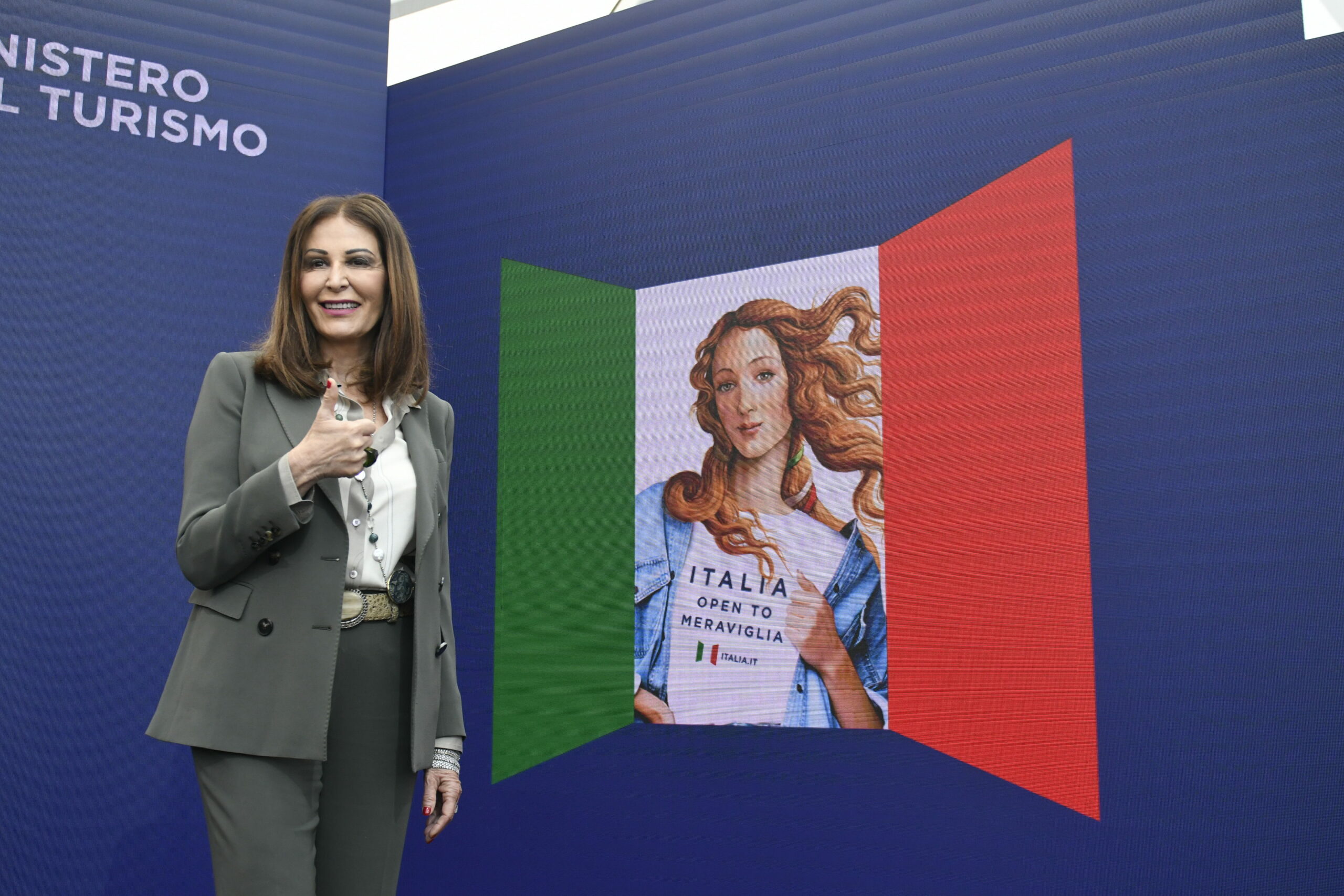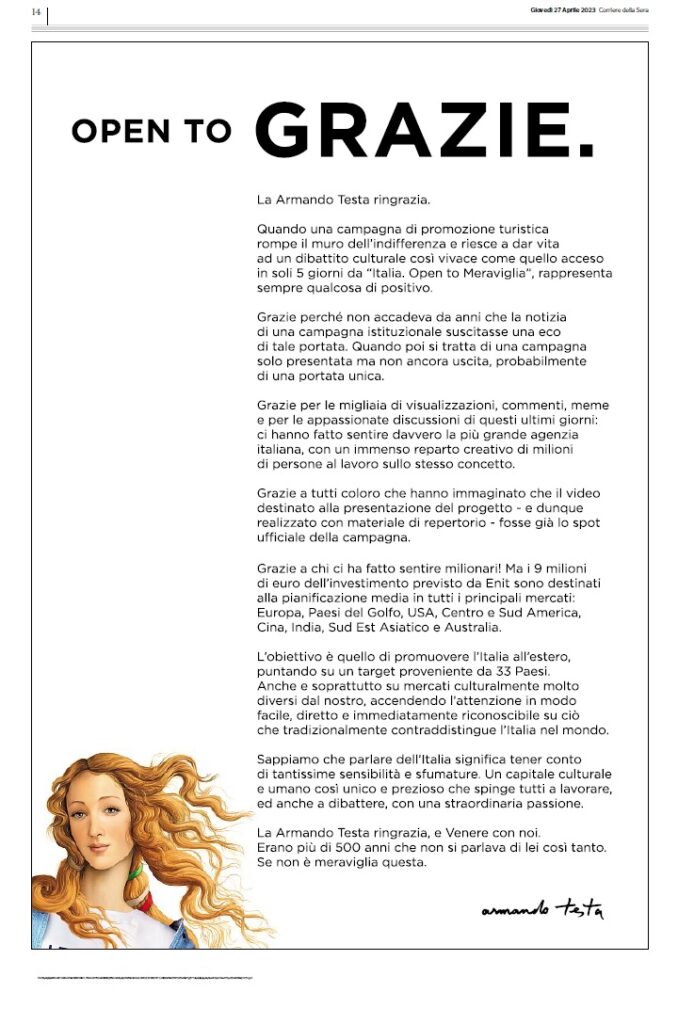Armando Testa out of his mind on Open to Meraviglia? Debate

Armando Testa's agency responds to criticism of the Venus influencer with tones that have provoked debate and controversy, not all of which are criticisms of the agency's self-praising advertising
They are the communication experts. That is, the creatives of Armando Testa's agency, but perhaps it was better when on their site it was almost impossible to find any trace of the spot (absent from the main one, found only in the newsroom subsite) commissioned by Daniela Santanché 's Ministry of Tourism. Instead today they wanted to buy nothing less than a page in the Corriere della Sera to explain their reasons, to counter the criticisms, all disguised as a thank you permeated by irony and sarcasm.

In fact, from the agency they let it be known that the goal has been achieved, that the social networks only speak of the Venere di Testa, that in short, they know a lot and those who criticize do not understand anything about advertising. Or worse, it even plays into their hands.
“When a tourism promotion campaign breaks down the wall of indifference and manages to give life to a cultural debate like the one ignited in just 5 days, it always represents something positive. Thank you because it hasn't happened for years that the news of an institutional campaign aroused such an impact". So from the Agency they put their hands forward: "It is a campaign that has only been presented but not yet released".
And then begins a passive-aggressive reply in the tone of a rather vicious irony which, predictably, will lead to further controversies: "Thanks to all those who imagined that the video intended for the presentation of the project – and therefore made with archive material – was already the official spot”. With these few lines we try to file away the criticisms that rained down from all over the smudges, the mistakes , the cheap stock images, the Slovenian backdrops, the testimonial model without his knowledge, further magnified by a site available in just four languages without the French, automatic translations that transform the cities of Camerino into Garderobe or Brindisi into Toast.
But from Armando Testa they go straight on their own way, in defense of the Venus influencer. “Thank you for the thousands of views, memes, comments: they really made us feel like the biggest Italian agency, with a huge creative department of millions of people working on the same concept”. As if to say: if it's ugly, the resources are what they are. Yes, the resources. As for the controversy over the costs: “Thanks to those who made us feel like millionaires! But ENIT's 9 million euros are earmarked for media planning in all the main markets."
In the closing they get carried away: “Armando Testa thanks her and Venus with us: it has been more than 500 years since we talked about her so much. If this isn't a wonder." In short, the ministerial campaign takes the lead in the work of art and not the other way around, in the counter-narrative of the advertisers.
Open to THANK YOU.
The @ArmandoTestaSpA AGENCY replies with a page on the @Corriere to the "millions of creatives" who have participated in the debate around the tourism promotion campaign linked to Botticelli's Venus.
I don't think it will go unnoticedpic.twitter.com/5DTAxRHq8d
— Adriano Attus (@adrianoattus) April 27, 2023
And immediately, predictably, another river of social controversy over the reply from the Armando Testa agency, with the Venus influencer once again shooting to the top of the country's trend topics. Adriano Attus from San Remasco, creative director of Il Sole 24 Ore , predicts the discussions that will follow and starts collecting them from his Twitter profile.
Close to please pic.twitter.com/zscOQVkPS2
— Marianna Aprile (@mariannaaprile) April 27, 2023
The journalist Marianna Aprile of the weekly Oggi (RCS) relies on irony: Close to pray (the page purchased in the Corriere opens with the macaronic claim Open to thanks). As well as my colleague Giuseppe Smorto , a lifetime in Repubblica : "I understand that Armando Testa needs some bullshit, I'm applying!"
I understood that Armando Testa needs bullshit, I'm applying! pic.twitter.com/cS47I7fyEP
— Giuseppe Smorto (@giusmo1) April 27, 2023
Selvaggia Lucarelli , who most of all had insisted on the flaws of Testa's Venus influencer campaign, underlines: “Piccata response from the series: as long as we talk about it. The demonstration that they don't have good copy and good ideas, in fact”.
Piqued answer from influencers of the series: as long as we talk about it. The demonstration that they don't have good copy and good ideas, in fact. pic.twitter.com/Nsp77uDENQ
— Wild Lucarelli (@stanzaselvaggia) April 27, 2023
Gianandrea Facchini , Founder & CEO of Buzztech brings up the minister's wardrobe.
The agency's letter that the video was not the real one, but an intermediate one (video currently no longer available anywhere…) is as cringey as the outfits of the minister in charge. a reverse marketing benchmark like few others in the history of advertising. #venere23 pic.twitter.com/9Rs8MBzdv8
— gianandrea facchini (@gianandrea) April 27, 2023
Matteo Flora , teacher, reputation and crisis expert, attacks: “What is 1990, not having understood that if everyone talks about you remembering you as an idiot, no, you don't magically become a genius. You're just a popular cretin." And then he remarks: "Popularity and value are different concepts".
Open to Grazie, open to Graziella, open to Grazieal…
What is 1990, not having understood that if everyone talks about you remembering you as an idiot no, you don't magically become a genius.
You're just a popular jerk.Popularity and value are different concepts. pic.twitter.com/6iW4ixVpdR
— Matthew GP Flora (@lastknight) April 27, 2023
"I don't think calling everyone who criticizes you stupid is a wise move", writes on his Facebook page Daniele Chieffi , former Head of Social Media management & Digital PR at Eni and Director of Communications and PR at the Minister of Innovation and digitization. “In communication, if the audiences understand something different from what you want to communicate, it is the communicator who is wrong, not the public. Isn't this the definitive campaign? Why present it then? Why, knowing that it would become public, why not register the domains, the social handles, not take care of the translations on the site (Camerino=Garderobe) and use Slovenian stock images?” “But let's assume – continues Chieffi – that this is really the case, why wait days before saying: “Stop everyone, it's not the real campaign, just the presentation of the creative idea”? However, now the letter is there and essentially says that we are all coaches of the national team, virologists and creatives "millions of creatives", so naively good as to believe that the agency had collected 9 million euros and that in the end thanks but thank you very much for having made an institutional campaign grind stellar numbers, under the banner of "provided they talk about it". Too bad it doesn't work like this: it doesn't matter how much you talk about it but how you talk about it. The world of communication has changed since the 90s”.
Enrico Sola , an expert in the field of advertising, known for the Suzukimaruti blog , notes in a long post: “Let one thing be clear: everyone in that agency knows very well that the “provided they talk about it” is nonsense that makes no sense. They use it all the same, as a smokescreen for those who are not good at communication (and if they don't change their minds, they are not good at life) and still say "everyone is talking about it: it's a successful campaign!".
This is a machine translation from Italian language of a post published on Start Magazine at the URL https://www.startmag.it/innovazione/armando-testa-open-to-meraviglia-dibattito/ on Thu, 27 Apr 2023 11:16:20 +0000.
